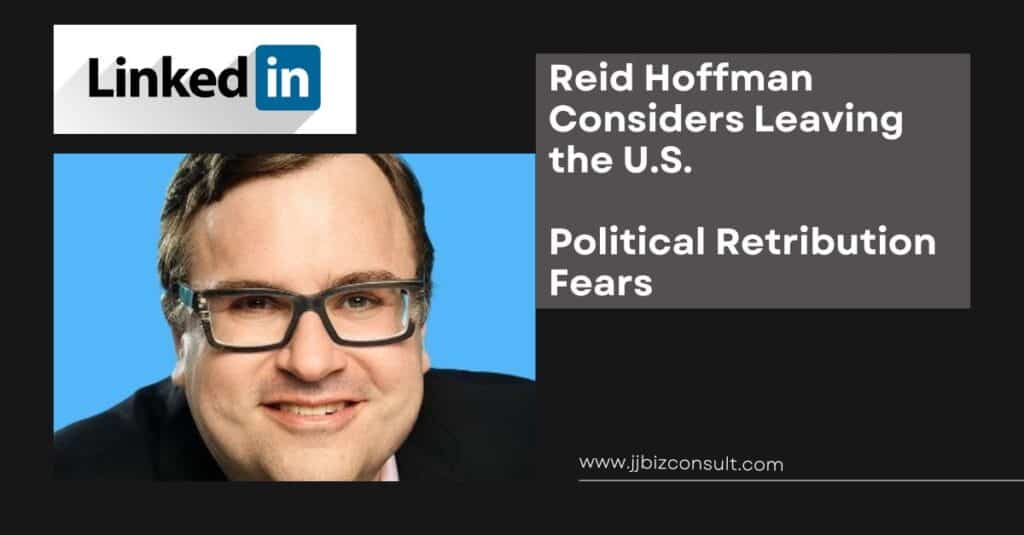
Reid Hoffman Considers Leaving the U.S
In a striking turn of events, Reid Hoffman, the co-founder of LinkedIn and a prominent Democratic donor, is contemplating leaving the United States following Donald Trump’s election victory. This potential exodus highlights the growing concerns among high-profile individuals regarding political retribution in an increasingly polarized environment. In this blog post, we will explore the implications of Hoffman’s considerations, the context surrounding his fears, and what this means for political discourse in America.
Reid Hoffman: A Brief Background

He is not just known for co-founding LinkedIn; he has also been a significant figure in American politics. A major supporter of Vice President Kamala Harris’s presidential campaign, Hoffman contributed upwards of $10 million to her efforts. His financial backing extended to various Democratic causes and candidates, positioning him as a key player in the political arena.
Reid Hoffman: Political Contributions and Controversies
Hoffman’s political involvement has not been without controversy. He was instrumental in financing a defamation lawsuit against Donald Trump filed by former New York magazine writer E. Jean Carroll. The case resulted in a jury awarding Carroll nearly $90 million in damages after finding Trump liable for sexual abuse and defamation. Hoffman’s support for such legal actions has made him a target for Trump’s ire.

The Fear of Political Retribution
According to reports from The New York Times, Hoffman has expressed concerns that Trump may seek revenge against his political opponents now that he has regained power. Trump’s previous statements have indicated a willingness to pursue those he perceives as enemies, raising alarms among individuals like Hoffman who have publicly opposed him.
The Context of Trump’s Election Victory
Trump’s victory in the recent elections has reignited fears among many Democratic donors and supporters. Hoffman’s contemplation of leaving the country reflects a broader sentiment among wealthy liberals who worry about potential repercussions for their political beliefs and actions. In private conversations, several major Democratic donors have discussed the possibility of relocating abroad to escape what they see as an increasingly hostile political climate.
The Broader Implications for Political Discourse
Hoffman’s situation raises critical questions about freedom of expression and the potential consequences for those who engage in political activism. As Hoffman himself noted in interviews, many business leaders are fearful of speaking out against Trump due to concerns about retaliation, including IRS audits or other forms of harassment.
A Divided Nation
The polarization evident in American politics has created an environment where individuals feel compelled to consider drastic measures, such as leaving the country, to avoid potential fallout from their political affiliations. This division not only affects high-profile figures like Hoffman but also resonates with everyday citizens who may feel similarly threatened by the current political climate.
The Context of Reid Hoffman’s Decision
Hoffman has been a significant player in Democratic politics, having supported Kamala Harris’s campaign and funded various legal actions against Trump. His involvement in high-stakes political battles has made him a target for Trump’s supporters, particularly given Trump’s history of seeking revenge on political adversaries. As Hoffman contemplates relocating abroad, this raises concerns among his peers about their own safety and standing in a politically charged environment.
Source: Fortune Hindustan Times
Potential Influence on Other Tech Billionaires
Hoffman’s situation could serve as a catalyst for other tech billionaires who share similar fears regarding political retribution. Here are several ways in which Hoffman’s decision might influence his peers:
- Increased Caution Among Donors: Other tech billionaires may become more cautious about their political contributions and public statements. If Hoffman, a prominent figure in Silicon Valley, feels compelled to leave due to backlash, others might reconsider their involvement in partisan politics.
- Shift in Political Engagement: The fear of retaliation could lead to a shift in how tech leaders engage with politics. Some may choose to withdraw from active political participation or support less controversial candidates to avoid becoming targets themselves.
- Formation of Political Alliances: In response to these concerns, tech billionaires might band together to form alliances that provide mutual support and protection against potential political fallout. This could lead to increased collaboration among wealthy donors who share similar views and fears.
- Relocation Trends: If more high-profile figures like Hoffman decide to leave the U.S., it could create a trend where other billionaires follow suit. This exodus could impact the tech ecosystem in Silicon Valley, potentially leading to a brain drain as talent and investment move elsewhere.
- Public Discourse on Political Safety: Hoffman’s decision may spark broader discussions about the safety of public figures in politics. As concerns about retribution grow, it could lead to calls for increased protections for individuals who engage in political activism.
The Broader Implications for Silicon Valley
The potential departure of influential figures like Reid Hoffman raises significant questions about the future of Silicon Valley’s political landscape:
- Impact on Innovation: If key players in tech feel threatened or marginalized, it may stifle innovation and investment in new technologies that require bold ideas and risk-taking.
- Political Polarization: Hoffman’s fears reflect a broader trend of polarization within American society. If tech leaders retreat from political engagement, it could exacerbate divisions and hinder collaborative efforts to address pressing societal issues.
- Change in Philanthropic Focus: With increasing concerns about political retribution, some billionaires may redirect their philanthropic efforts away from politically charged initiatives towards more neutral causes that do not attract controversy.
Conclusion: Reid Hoffman Considers Leaving the U.S
Reid Hoffman’s contemplation of leaving the U.S. due to fears of political retribution highlights the increasingly fraught relationship between wealth, politics, and personal safety in America today. His decision could have far-reaching implications for other tech billionaires, potentially influencing their engagement with politics and shaping the future landscape of Silicon Valley.As the political climate continues to evolve, it will be essential for tech leaders to navigate these challenges carefully while considering their roles as both innovators and influential voices in society. The decisions made by individuals like Hoffman can set precedents that resonate throughout the industry, impactin.
NFT by LinkedIn Founder Reid Hoffman – What is the Buzz about it?
Hall of Shame : Forbes Spotlight on Individuals Accused of Wrongdoing





